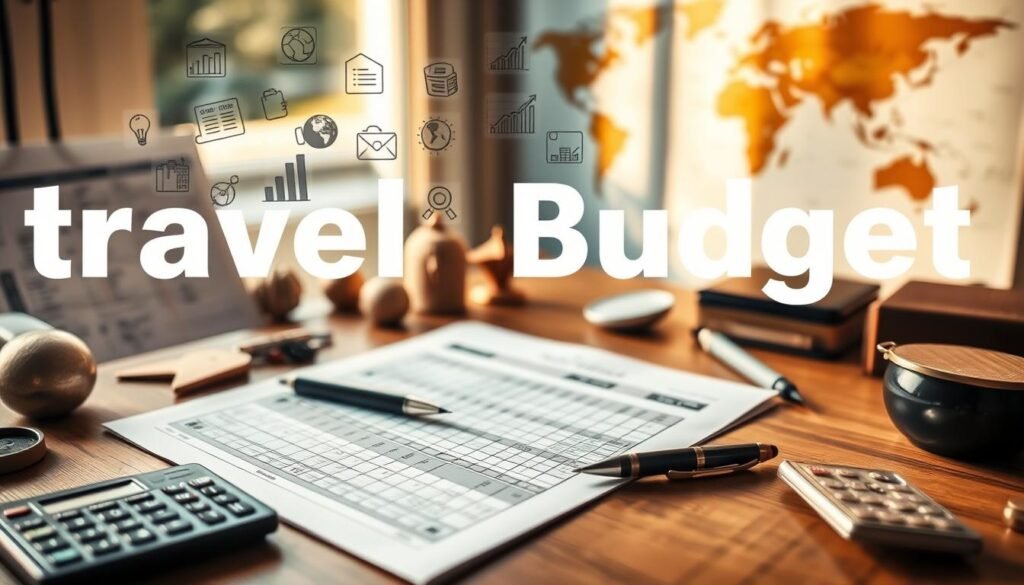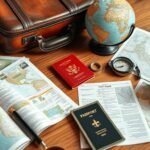
How to Create a Travel Budget That Actually Works
Posted in :
Planning a trip can be overwhelming, especially when it comes to managing expenses. As I reflect on my own travel experiences, I realize that a well-crafted travel budget is crucial to making the most of my adventures.
It’s not just about cutting costs; it’s about allocating resources to create unforgettable experiences. A good budgeting for travel plan allows for flexibility and accommodates unexpected expenses. This ensures that my travels are stress-free and enjoyable.
Key Takeaways
- Understand your financial reality to plan a realistic travel budget.
- Be flexible to accommodate unexpected expenses.
- Prioritize experiences over costs.
- A well-planned budget ensures stress-free travels.
- Allocate resources to create lasting memories.
Why Most Travel Budgets Fail
Understanding why most travel budgets fail is key to a successful trip. Many travelers overspend or face unexpected costs. This can ruin even the best plans.
Common Budgeting Mistakes Travelers Make
Travelers often make budgeting mistakes that lead to failure. These include:
- Underestimating costs: Many travelers don’t plan for all expenses, leading to surprises.
- Being overly optimistic: Budgets that are too low can lead to overspending.
- Not tracking expenses: Not keeping an eye on spending can cause budget blowouts.
As Mark Twain once said,
“The reports of my death are greatly exaggerated.”
Similarly, our travel budgets are often too high, showing the need for realistic planning.
| Common Mistakes | Consequences | Solutions |
|---|---|---|
| Underestimating costs | Unexpected expenses | Research and account for all expenses |
| Being overly optimistic | Budget shortfall | Create a realistic budget based on past experiences |
| Not tracking expenses | Overspending | Use budgeting apps or spreadsheets to track expenses |
The Emotional Side of Travel Spending
The emotional side of spending on travel is a big factor in budget failure. The excitement of planning can lead to overspending.
To fight this, knowing your spending triggers is crucial. Set aside time to review your budget or use cash to make spending feel real.
By understanding these challenges and taking steps to overcome them, travelers can make a budget that fits their financial goals and dreams.
Understanding Your Travel Style and Financial Reality
Knowing your travel style and financial situation is key to a good travel budget. To make a budget that works, match your financial plans with your travel dreams and spending habits.
Identifying Your Personal Travel Priorities
Figuring out what you value most in travel is important for travel cost management. What do you love most about traveling? Is it trying new foods, seeing historical sites, or exploring nature? Knowing this helps you spend your money wisely.
- List your top travel priorities
- Research the costs of these activities
- Put money aside in your budget for them
For example, if you love trying local food, set aside more for dining. If cultural experiences are your thing, budget more for museums and tours.

Analyzing Your Past Travel Expenses for Better Planning
Looking at your past travel costs is a smart move for budget-friendly travel planning. Going over your past spending helps you spot spending patterns and where to save.
- Collect your past travel receipts and records
- Sort your expenses (like where you stayed, what you ate, and how you got around)
- Find ways to spend less without ruining your trip
By reviewing your past spending, you can plan better for your next trip. This helps you predict costs, avoid overspending, and stick to your budget while still achieving your travel goals.
Good travel cost management is about more than just tracking money. It’s about making smart choices about how you spend it. By focusing on what’s important and adjusting based on past trips, you can have a more enjoyable and worry-free journey.
How to Create a Travel Budget That Actually Works
To turn your travel dreams into reality, you need a budget that’s both inspiring and realistic. It’s not just about cutting costs. It’s about making smart financial choices that match your travel goals.
Setting Inspiring Yet Realistic Financial Goals
Setting financial goals for your trip can be thrilling and challenging. Start by figuring out what you want to achieve with your budget. Are you saving for a certain destination or experience? Be realistic about your financial capabilities and aim for achievable targets.
For example, if you dream of visiting Europe, research the costs of your desired places and activities. This will help you set a savings goal that’s realistic.
Example of Setting Realistic Goals:
| Destination | Estimated Cost | Savings Target |
|---|---|---|
| Paris, France | $2,000 | $500 per month for 4 months |
| Rome, Italy | $1,800 | $450 per month for 4 months |
Breaking Down Expenses by Category
After setting your financial goals, break down your expenses into categories. This helps you see where your money goes and make smart spending choices. Common categories include transportation, accommodation, food, and activities.

If you love adventure, you might spend more on activities and experiences. If you’re a foodie, you might focus on dining and culinary adventures.
Building in Flexibility for Unexpected Costs
Unexpected costs can pop up during your trip. To handle this, add flexibility to your budget. Set aside a contingency fund for emergencies or travel issues. This keeps your finances on track and reduces stress during your trip.
By following these steps, you can create a travel budget that’s both realistic and flexible. This way, you can fully enjoy your travel experiences.
Essential Tools to Transform Your Travel Budget Planning
Travel budgeting doesn’t have to be hard. The right tools can make a big difference. You can create a travel budget that works well with technology and old-school methods.
Best Budgeting Apps for American Travelers
Budgeting apps are a big help for travelers. They let you track your spending, sort your money, and set goals. Here are some top apps for American travelers:
- Mint: It’s great for tracking your money and budgeting.
- Personal Capital: It helps with financial planning and tracking investments.
- YNAB (You Need a Budget): It teaches you to manage every dollar.

Spreadsheet Templates That Simplify Budget Tracking
Spreadsheet templates are great for hands-on budgeting. They let you tailor your budget to your needs. Google Sheets and Microsoft Excel have many budgeting templates.
| Template | Features | Best For |
|---|---|---|
| Simple Budget Template | Basic income and expense tracking | Those new to budgeting |
| Detailed Travel Budget Template | Category-specific expense tracking, daily budget limits | Travelers with complex itineraries |
| Monthly Budget Planner | Long-term financial planning, savings goals | Travelers planning ahead |
Digital vs. Analog Tracking Methods
Choosing between digital and analog budgeting depends on what you like. Digital tools are easy and always up-to-date. Analog methods are more hands-on and can be fun.
Digital tracking is perfect for those who are always online. Analog tracking is better for those who like a hands-on approach or want to avoid digital distractions.
The best method is one you’ll use all the time. Whether it’s a budgeting app, a spreadsheet, or a notebook, pick what works for you and stick with it.
Pre-Trip Saving Strategies That Fuel Your Travel Dreams
Starting your journey to your dream destination means planning your savings. Saving for your trip is more than just cutting costs. It’s about being smart with your money.

Creating a Dedicated Travel Fund That Grows
One smart way to save for your trip is by setting up a travel fund. This means setting aside money regularly. You can do this by:
- Setting up an automatic transfer from your checking account to your savings or travel fund account.
- Using a separate account specifically for travel savings to avoid commingling funds.
- Taking advantage of high-yield savings accounts that earn interest.
Painless Ways to Cut Daily Expenses in American Life
Reducing daily expenses can help grow your travel fund. Here are some easy ways to do it:
- Cooking at home instead of dining out or ordering takeout.
- Canceling subscription services you don’t use, like streaming services or gym memberships.
- Using public transportation, walking, or biking instead of driving a car.
By making these simple changes, you can save a lot without feeling like you’re missing out.
Side Hustles Specifically for Travel Funding
Side hustles can give you the extra money you need for travel. Consider:
- Freelancing in your area of expertise, such as writing, graphic design, or consulting.
- Selling handmade products or crafts online through platforms like Etsy.
- Participating in the gig economy by driving for a ride-sharing service or delivering food.
These side hustles not only bring in more money. They also offer flexibility and can grow with your needs.
By using a travel fund, cutting expenses, and starting side hustles, you’ll be on your way to making your travel dreams real. Start these strategies today, and make your travel dreams come true.
Smart Booking Tactics to Maximize Your Travel Dollar
Traveling on a budget starts with smart booking. It’s about using rewards and avoiding extra costs. These tips can make your trip better without breaking the bank.
Timing Your Bookings for Maximum Savings
Booking at the right time can save you a lot. Flights, hotels, and cars are cheaper if you book wisely. For example, flying on Tuesdays or Wednesdays can be cheaper than weekends.
Early bird discounts and last-minute deals are great for saving. Being flexible with your travel dates can also lead to big savings.
Leveraging American Credit Card Points, Miles, and Rewards
Credit card rewards are a smart way to book. Cards like Chase Sapphire Preferred offer points for travel. These rewards can help you save on your trip.
- Earn points or miles on everyday purchases
- Redeem rewards for flights, hotel stays, or other travel expenses
- Take advantage of sign-up bonuses and anniversary rewards
Hidden Costs to Watch For When Booking
Be careful of hidden costs when booking. Fees for bags, seats, or hotel extras can add up. Always check the details to avoid surprises.
| Hidden Cost | Average Cost | Tips to Avoid |
|---|---|---|
| Checked Bag Fees | $30-$60 per bag | Pack light or choose airlines with free checked bags |
| Hotel Resort Fees | $20-$50 per night | Research hotels that don’t charge resort fees |
By watching out for these costs and using smart booking, you can save money. This way, your trip will be more enjoyable and affordable.
On-the-Ground Budget Management That Preserves Your Experience
Traveling on a budget means planning and being flexible. It’s key to a stress-free trip. You can enjoy your journey without overspending.
Daily Spending Limits That Don’t Sacrifice Enjoyment
Setting daily spending limits helps manage costs without losing out on fun. By setting a daily budget, you can choose how to spend your money. This way, you focus on what you really want to do.
For example, if you’re in a city with free attractions, you might spend more on food or shopping. But if attractions are pricey, you’ll need to adjust your budget.
Balancing Splurges and Saves
Traveling is about trying new things, sometimes by spending a bit more. But saving money is also crucial for a balanced budget.
Look for ways to save without missing out on the fun. Choose affordable places to stay or cook some meals. This way, you can spend more on special activities.
Money-Saving Hacks for Popular US and International Destinations
Every place offers ways to save money. For instance, using public transport can cut down on costs in cities with good systems.
- Take free walking tours or use city passes for discounts on attractions.
- Visit popular spots during the off-season for cheaper prices.
- Use local tips or travel apps for affordable dining and happy hour deals.
With these tips, you can have a great trip without breaking the bank. Good budget management is about making smart choices. It lets you enjoy everything a place has to offer while keeping your finances in check.
Budget-Friendly Travel Experiences That Create Lasting Memories
Planning ahead can make your trip rich and fulfilling without spending a lot. Good financial planning for travel is key to enjoying your trip fully.
Free and Low-Cost Activities Worth Seeking Out
Traveling is about exploring new places, and it doesn’t have to be expensive. Many places offer free or low-cost activities that are just as memorable as pricey ones.
- Visit local markets or street fairs to experience the culture.
- Explore national parks or public gardens for a connection with nature.
- Take a self-guided walking tour of historical sites.
These activities save money and give you a real feel of the place you’re visiting.
Eating Well Without Breaking the Bank
Eating out can be a big expense while traveling. But, you can enjoy local food without spending too much. Try these budget-friendly tips:
- Street food or local eateries for authentic meals at lower prices.
- Grocery shopping at local stores to cook some meals.
- Happy hour deals or early bird specials at restaurants.
Being smart about where you eat can help you enjoy local flavors without breaking the bank.
Accommodation Alternatives That Save Money and Enhance Your Trip
Where you stay can greatly affect your travel costs. Look into these alternatives to traditional hotels:
- Hostels or guesthouses for a local experience.
- Vacation rentals for more space and amenities.
- Camping or glamping for a unique outdoor adventure.
These options save money and make your trip more memorable by connecting you with the local environment.
By using these budget-friendly options, you can make lasting memories without overspending. Good financial planning for travel and budgeting for trip expenses are essential for a stress-free and enjoyable trip.
Handling Budget Emergencies While Traveling with Confidence
Travel plans can go wrong, but you can handle budget emergencies well. Even with the best planning, unexpected costs can arise. Being ready can make a big difference.
Creating an Emergency Fund Buffer
An emergency fund is key when you travel. It’s a safety net for unexpected costs. To start one, save a part of your travel budget in a separate account. This fund helps with medical bills, travel cancellations, or other surprises.
- Determine the amount you need based on your travel plans and potential risks.
- Set up a separate savings account specifically for your emergency fund.
- Automate your savings by setting up regular transfers.
What to Do When You Exceed Your Budget
Going over budget can be stressful, but there are ways to manage it. First, figure out where you overspent. Then, adjust your spending for the rest of your trip.
- Prioritize your spending based on what’s most important to you.
- Cut back on non-essential expenses.
- Consider alternative, cost-effective activities or accommodations.
Smart Ways to Access Additional Funds Abroad
Sometimes, you need extra money while abroad. Having a plan for this can make your trip less stressful and more enjoyable.
- Using credit cards with no foreign transaction fees.
- Having a debit card that allows international transactions.
- Utilizing online banking services to transfer money internationally.
Conclusion: Turning Your Travel Budget into Unforgettable Experiences
Creating a travel budget is just the start. The real magic comes when you turn it into unforgettable experiences. By following the strategies in this article, you can make a budget that lets you enjoy your trip fully.
With a good budget, you can focus on making memories, not worrying about money. Be flexible and adapt to changes. Use travel planning tools to research and book your trip. And don’t be afraid to try new things.
By learning how to create a travel budget and using budget travel tips, you’ll make lifelong memories. So, start planning your next adventure and make the most of your travel budget.

